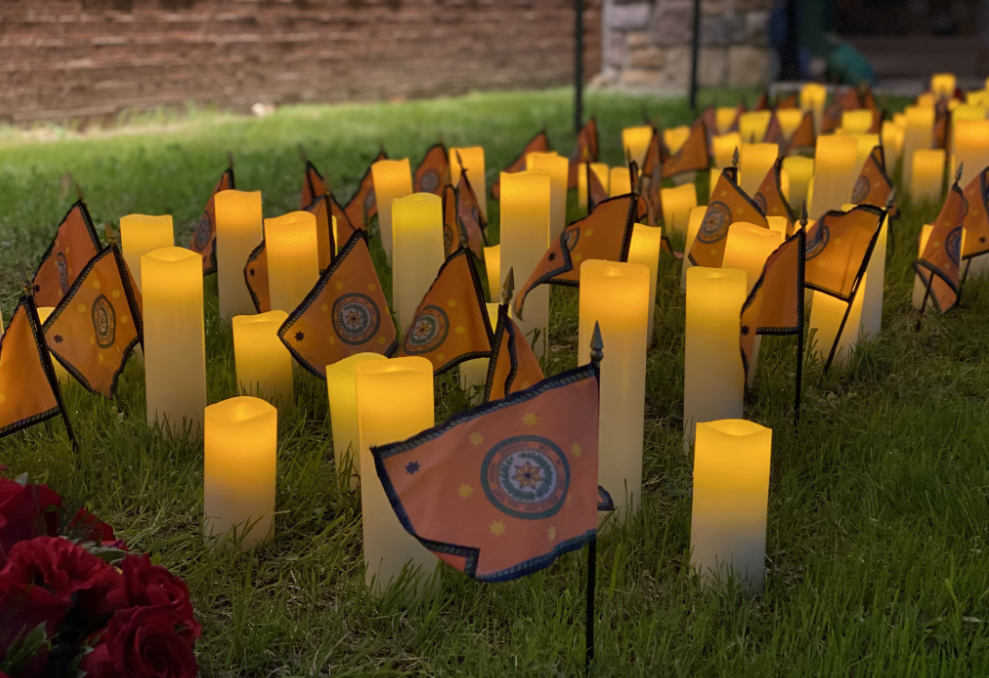
- Details
- By Native News Online Staff
TAHLEQUAH, Okla. — Last Thursday, March 18, marked the one-year anniversary of the loss of the first Cherokee citizen and Oklahoman, Merle Dry, who passed away from Covid-19.
To mark the anniversary and show honor to Dry and the additional 106 Cherokee citizens lost to the deadly coronavirus, the Cherokee Nation held a candlelight memorial at the tribe's W.W. Keeler Tribal Complex in Tahlequah, Okla.
“Today, our obligation is to give each of these lives lost even more meaning. In their names, let us keep each other safe. In their names, let's have each other's back,” Chief Chuck Hoskin, Jr. said. “Let’s live each day to the fullest. In their names, let us embrace each other. In mourning those who have left us, we remain mindful of how to beat the COVID-19 virus. That means getting the vaccine, wearing a mask in large gatherings, and following the latest public health recommendations. Each life lost to COVID-19 is a deep loss, and each life lost was meaningful. We can give even deeper meaning to those we lost by working together, in their memory, to keep each other safe and keep our communities strong.”
Other speakers included Deputy Principal Chief Bryan Warner, District 4 Tribal Councilor Mike Dobbins, Speaker of the Council Joe Byrd and Chief of Staff Todd Enlow. A prayer was offered by Cherokee National Treasure Crosslin Smith.
The memorial included 107 candles in honor of Dry and the 106 lives lost in the Cherokee Nation health system since the Covid-19 pandemic began. There were also five empty chairs reserved during the memorial for Cherokee Nation employees lost to the virus.
“How do we build one other up? It’s simple: with kindness, with love, and with compassion,” Deputy Chief Warner said. “This is something that we, as Cherokees, have shown throughout this pandemic. Because of the great loss that we’ve had, our hearts are grieving, and we must have compassion as we move forward. We must use kindness, and we must wrap everything that we do in love. Let us remember those who passed from this Earth, and let us honor them by extending the grace and mercy that our creator extends to each and every one of us.
The memorial also featured three members of the Cherokee National Youth Choir, who performed “Orphan Child” and “Amazing Grace” in the Cherokee language. The public was invited to view the memorial live on the Cherokee Nation’s official Facebook page and to leave memories, thoughts and prayers in honor of those they have lost to Covid-19.
More Stories Like This
Native News Weekly (August 25, 2024): D.C. BriefsNavajo Nation Mourns the Passing of Former Vice President Rex Lee Jim
Deb Haaland Earns Endorsement From Communications Workers of America Local 7076
University Soccer Standout Leads by Example
Two Native Americans Named to Democratic Congressional Campaign Committee's“Red to Blue” Program
Help us defend tribal sovereignty.
At Native News Online, our mission is rooted in telling the stories that strengthen sovereignty and uplift Indigenous voices — not just at year’s end, but every single day.
Because of your generosity last year, we were able to keep our reporters on the ground in tribal communities, at national gatherings and in the halls of Congress — covering the issues that matter most to Indian Country: sovereignty, culture, education, health and economic opportunity.
That support sustained us through a tough year in 2025. Now, as we look to the year ahead, we need your help right now to ensure warrior journalism remains strong — reporting that defends tribal sovereignty, amplifies Native truth, and holds power accountable.
 The stakes couldn't be higher. Your support keeps Native voices heard, Native stories told and Native sovereignty defended.
The stakes couldn't be higher. Your support keeps Native voices heard, Native stories told and Native sovereignty defended.
Stand with Warrior Journalism today.
Levi Rickert (Potawatomi), Editor & Publisher

